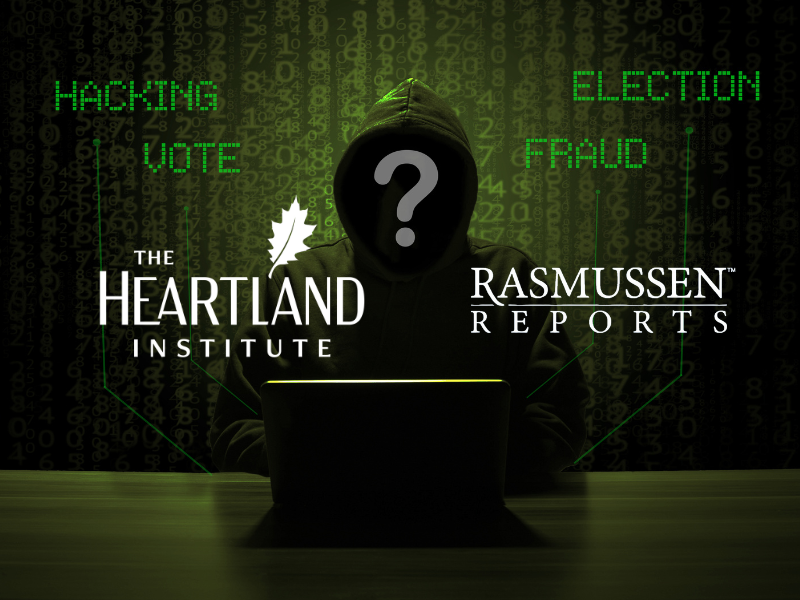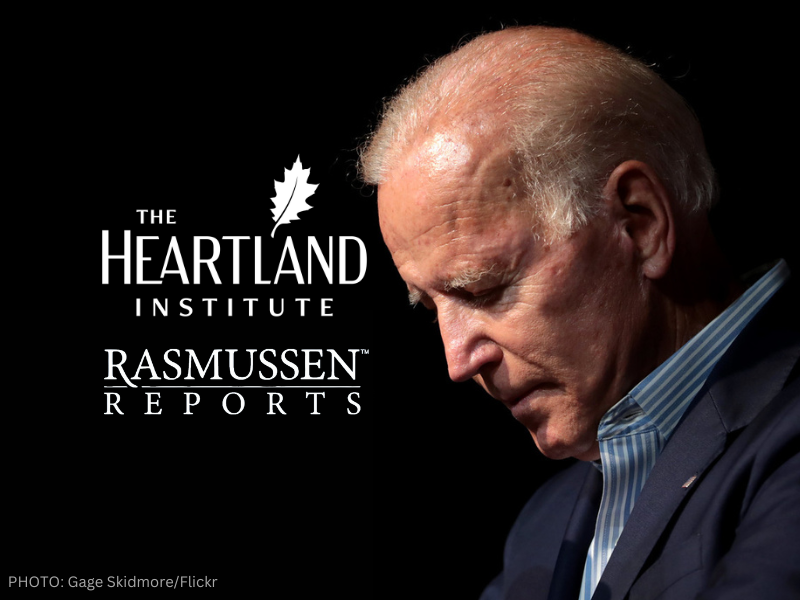Presidential election years always seem to mark dramatic and historically important milestones. The political parties nominate their candidates for the highest governmental office in the land. Party platforms are written and offered to the voting public with great fanfare about how, if their candidates to the White House and the Congress are elected, a new dawn will spread over the country; and a new dawn of peace, prosperity, and political harmony and justice will follow for all, if their side wins.
At one level, this year’s presidential election has been no different from others. Donald Trump versus Joe Biden. An America made “great again” or a new dispensation of redistributive “social justice.” Each candidate and party has painted the other in the darkest of political colors.
The political paternalists demonize each other.
Reelect Donald Trump and America faces the end of democracy with fascist goosestepping down Pennsylvania Avenue in Washington, D.C. Put Joe Biden in the White House, instead, and Stalin’s Siberian Gulag system of labor camps will seem like a winter snow resort compared to what will happen to America. We have seen this before. Remember the Democratic Party campaign commercial during the 1964 presidential election that showed a little girl holding a flower who would be vaporized by a nuclear mushroom cloud if Barry Goldwater were to win the election instead of Lyndon Johnson.
Then, when it seemed that Ronald Reagan might possibly make a run for the White House after his time as governor of California in the 1960s, he was satirized as an empty-headed right-wing nut job by the Democrats. In the 1967 movie, In Like Flint, the main character, played by James Coburn, discovers that the president of the United States has been kidnapped and an actor put in his place who is controlled by a group of women who want to take over the world. At one point, Coburn looks toward the camera and says in total and shocked disbelief, “An actor as president?” referring back to Reagan’s earlier career in Hollywood.
But it must be said that this presidential election year has been more acrimonious, more filled with dire warnings about the fate of the county than I can remember. The only period in my lifetime that compares in terms of the anger, hatred, fear, and violence in the streets surrounding a presidential election and the events leading up to it was the middle and late 1960s as a result of the Civil Rights Movement and opposition to the Vietnam War.
This year has been portrayed by both of the two major political parties as a life-and-death struggle over the future of the country. The question is, why? Is the country at a turning point? What makes it more so, than in the past, if it is?
A time when politics did not threaten liberty
Sometimes it is worth recalling that, while American politics and elections have always been filled with forms of such conflict-laden rhetoric, the outcomes often never seemed to threaten the liberty of the people or the institutions of the country. To have an appreciation of this, we may turn to Francis Lieber (1798–1872), a German-born scholar who came to the United States in 1827 and who in 1856 became at Columbia University the first professor of political science in the United States
His 1835 book, A Stranger in America, is written in the form of letters to a friend in Germany about his impressions of the United States after residing in the country for eight years. He points out that in America the outcomes from political elections never seem as threatening in their consequences as political changes often appear in some European countries, particularly in France, he said.
First, the frequency of elections in the United States on a regularized basis meant that any outcome is institutionally temporary, in that the party and candidates who have lost know that they can try to turn the tables and come back into office within a few years. Hence, losing and living under the policies of the winning candidates of the opposing party is not permanent. “The very frequency of elections neutralizes the injurious effect, which, otherwise, the disappointment they necessarily must bring to one party, would have on many individuals. Today a man is thrown out, a party vanquished, — tomorrow he goes to work again, and hopes for success the next time,” said Lieber.
But more important, it was understood and known, explained Lieber, that no matter what the results of an election and the change in the direction of certain domestic policies as a consequence, it was taken for granted that every citizen knew that his fundamental rights to his life, liberty, and private property were basically secure from any radical and transformative changes as the result of any election. In other words, there were certain principles concerning liberty and the role of government in society that almost all citizens shared and that ensured that no change in political parties in office would undermine. Or, as Francis Lieber expressed it,
However great the excitement may appear, on paper or in words [during an election], the people know very well that their lives and property are not in jeopardy; that whatever party may come in or go out, the broad principles of the whole system will be acted upon, the general laws will be observed. Should it ever come with us to that point, that the monstrous idea should prevail, that liberty exists there only where the majority can do what they please — while, on the contrary, the degree of existing liberty can justly be measured only by the degree of undoubted protection which the minority enjoys, and the degree in which the sovereign, be he one or many, or represented by a majority, is restricted, by fundamental laws, from acting on sudden impulses and impassioned caprices, to which a body of men is as subject as a single man — should it ever come with us to this absolutism, for absolutism is there where the representative of sovereignty can act capriciously and uncontrolled; then, indeed, our insane hospitals would become as much the direful records of man’s fickleness as … the French hospitals now are [as a result of politics].
When the private sector was more important than government
What also reduced concerns and anxiety among the citizenry and among those who may have run for office, but who had lost or been replaced, was that there was a predominantly private sector into which the would-be or former office holder could return to earn a living independent of and free from government control or vindictive actions by the victor in the election. Furthermore, explained Lieber, the institutions of the society and the attitudes of the general public of a belief in free and open and unmolested political and public dissent and disagreement meant that those who lost could once again make their case to the electorate with the hope of returning to office in the next regularized election, with no fear of oppression. Again, in Lieber’s words,
There is in this country [America] no dishonour whatever connected either with being turned out of office or being vanquished at an election. It is no shame to be defeated. One party must be victorious, and the other tries to be so the next time. An American, as the member of a party, may be defeated, he is not conquered. Persecutions do not take place; the successful party does not annihilate its opponents — each party continues to have its meetings, papers, etc. And, as in those periods in which many persons are discharged from public places, it is most openly acknowledged that politics alone is the reason, all blemish which may be attached to the loss of office in public service, in countries where no such changes occur, must vanish; while, again, the country offers so many opportunities of gaining one’s livelihood, that, also, in this respect, a loss of office is not so ruinous as in France, where a man often thinks his honour is gone, and his career for ever destroyed, as soon as he is thrown out of public employment. The frequency of changes, likewise, prevents the higher offices from becoming the objects of so ardent an ambition as to affect seriously the mental faculties of the disappointed candidates.
The fight for liberty limited the powers of government.
The bedrock that made all this secure, safe, and certain was a widely shared desire and determination that each and every person should be recognized and protected in
his individual right to life, liberty, and honestly acquired property. In his later and widely read work, On Civil Liberty and Self-Government (1853; revised ed., 1874), Lieber had emphasized that the unique contribution of Great Britain and the United States to the principle and practice of human liberty was the recognition that the core of a free society is the protection of the individual in his rights from encroachments and abridgments by government.
“To protect the individual against interference with his personal liberty by the power-holder is one of the elementary requisites of all freedom, and one of the most difficult problems to be solved in practical politics,” as demonstrated, Lieber said, in the long battle in Great Britain to win the needed safeguards against unwarranted arrest, or search and seizure of papers and property, as well as the writ of habeas corpus.
But especially in America, Lieber went on, there had been the insistence on the “liberty of conscience,” that unabridged liberty of belief, without which “no system of liberty can be considered comprehensive…. It belongs to American liberty to separate entirely the institution which has for its object the support and diffusion of religion from the political government.”
Private property as the bedrock of a free society
But behind all such principles and practices of a society of liberty was the respect for and the secured protection of private property. The power of government to tax, regulate, and confiscate private property had to be restrained and restricted as legally as was possible under all circumstances. Once more quoting Lieber,
One of the staunchest principles of civil liberty is the firmest possible protection of individual property — acquired or acquiring, produced and accumulated, or producing and accumulating. We include, therefore, unrestrained action in producing and exchanging, the prohibition of all unfair monopolies, commercial freedom, and the guarantee that no property shall be taken except in the course of [legal and constitutional due process of] law…. The true protection of individual property demands likewise the exclusion of confiscation.
… Every single subject here mentioned, monopolies [granted by government], freedom of trading, freedom of home production, freedom of exchange, possession of property, taxation and confiscation — each one has a long history, full of struggle against error and government interference running through many centuries and even a thousand years.
Finally, while Lieber highlighted the origin and history and meaning of such personal, civil, and economic liberties in terms of the British and American experiences, he emphasized that those were principles and ideals of freedom that were to be considered universal and true for all human beings everywhere and at all times.
A love of liberty must guide opposition to the state.
Lieber, who had taught political economy at the University of South Carolina, from 1835 to 1856, before moving to Columbia University in New York, was well aware that the promise of equal rights and an equality before the law had not been practiced in the South, having witnessed the reality and cruelty of slavery; and that such equality was not fully practiced after the Civil War, either, for those who had been freed from slavery.
But, nonetheless, he considered individual liberty and equality before the law to be the principles that guided and directed America more into that right direction over time. As Lieber movingly said,
It is the liberty we prize and love for a hundred reasons, and which we would love if there were no other reason than that it is liberty. We know it is the political state most befitting to conscious man…. We are proud of our self-government and our love of the law as our master, and we cling the faster to all these ancient and modern guarantees, the more we observe that, wherever the task which men have proposed to themselves is the suppression of liberty, these guarantees are sure to be the first objects of determined and persevering attack…. [So] may we learn what those who love liberty ought to prize, by observing what those who hate freedom suppress or war against.
America’s new totalitarians hate the idea of liberty.
And that brings us back to our own times and to the political contest of 2020. Notice how desperate so many people are in America about the outcome of the presidential and congressional elections. The progressive Left seethe with anger, resentment, and contempt about everything that America represents. They loathe the ideas and the institutions of individual liberty, limited government and free markets. All they see, when they hear those words, is “racism,” “sexism,” “oppression of people of color,” “white privilege,” and “social injustice.”
That is because they have digested the entire baggage of socialist and Marxist ideology and indignation against what they understand to be capitalism. They, in fact, reject everything that America represents. The pulling down of statues, the defacing of buildings, the insistence that monuments be either renamed or demolished, are all the symbolic manifestations of their determination to wipe away the very history and the idea of America, other than as an example of evil.
In its place they would make a new world, but a new world that is, in fact, the old world of political paternalism, economic planning, and social tyranny of every corner of life. They are the latest generation of the totalitarians in our midst. Cancel culture is the erasing of all unwanted history, while systemic racism theory is the demand for the identity politics that is a return to the crudest of tribal collectivism, a defining of each and every individual on the basis of his racial characteristics for purposes of human association, including the political bestowing of group rewards and punishments — as determined and dictated by our new totalitarian tribalists, once they are fully in power.
Nothing opposes them within the mainstream of Democratic Party politics, the reason being that
after decades of collectivist indoctrination, moderates within the Democratic Party all agree with the premises of the more radical members of the progressive movement. Hence, they cannot challenge their more totalitarian cousins without questioning their own fundamental ideas about the meaning of a more socially just and politically correct society.
Moreover, to do so in any meaningful way runs the risk that the more radical ones will humiliate and embarrass and threaten to purge them from good standing on the Left by insisting that “you are either for us or against us,” and if you do not accept the totalitarian agenda, then you are shown “really” to be an apologist for and an accomplice to the racist right-wing capitalist system of oppression, exploitation, and injustice.
America’s conservatives are no less paternalists against liberty.
On the other side, the Republicans have also abandoned those earlier ideas of individual liberty and limited government. The conservative insiders decided long ago that you cannot win by running against the interventionist-welfare state. People are just too wedded to their Social Security payments, some form of government-funded and subsidized medical care, handouts to farmers, regulations, protections limiting domestic and foreign competition for the benefit of selected industries and occupations, and a paternalist program of preventing consenting adults from doing unvirtuous things.
Donald Trump epitomizes the worst elements of this conservative and Republican drift. There is nothing he has advocated or opposed that other Republicans have not also been calling for, for a long time. Trump’s problem is that he says it all more openly, more bluntly, more crudely, and does not care if others think he is not playing nice.
Trump’s “make America great again” nationalism, his economic protectionism, his search for social-welfare “fixes” that leave government involvement in place, and his schizophrenia on not being but continuing to play policeman of the world, are all aspects of the conservative rhetoric and policy agenda. If only Trump would say it, well, more tactfully and less irritatingly without a tweet, think many conservatives.
Each side in this political contest sees a victory by the other side in apocalyptic terms. For the Democrats and progressives, four more years of Trump’s boorish broadsides and arrogant manner means more racism, sexism, and growing anti-democratic fascism. If Biden wins, the floodgates to totalitarian tribalism are opened wide.
The real battle is over liberty, not contests between paternalists.
When this is being written, the November 2020 presidential election day is still a way off. The reader will possibly know the outcome when he reads this piece. But the outcome in the context of this article is less important than the realization that the America that Trump and Biden have been fighting over for political control is not the same America about which Francis Lieber was writing in the nineteenth century.
In our time, whoever wins will, no doubt, attempt to use, abuse and possibly transform the political institutional setting on which any freedom still remaining in America is dependent. Think back. How many times have you heard the words “liberty” or “limited government” cross the lips of Donald Trump? He has his own unlearned conception of unitary executive power and authority. Recall that during the spring of 2020, he said he had the power, on his own, to order the shutdown of the American economy in the face of the coronavirus and, just as arbitrarily, to open it up on his command. While the Left is on a mission from a sanitized Marx (after all, Marx was a racist and an exploiter of women) to bring the American experiment in freedom and free government to an end.
Francis Lieber suggested that radical political transformations and uncertainties can unhinge the mental states of those in or dependent on government. This is the America we live in today. It is the result of abandoning the ideals of liberty that Lieber could praise in the nineteenth century as something real and which he hoped would be made better and more consistent.
Out of our current political wreckage, those who care about and value liberty will have to work to rebuild the ideas and spirit of freedom that once were America’s, so it may once again be that land of promise and opportunity that attracted men such as Francis Lieber, a lover of liberty.
[Originally posted on Future of Freedom Foundation (FFF)]





